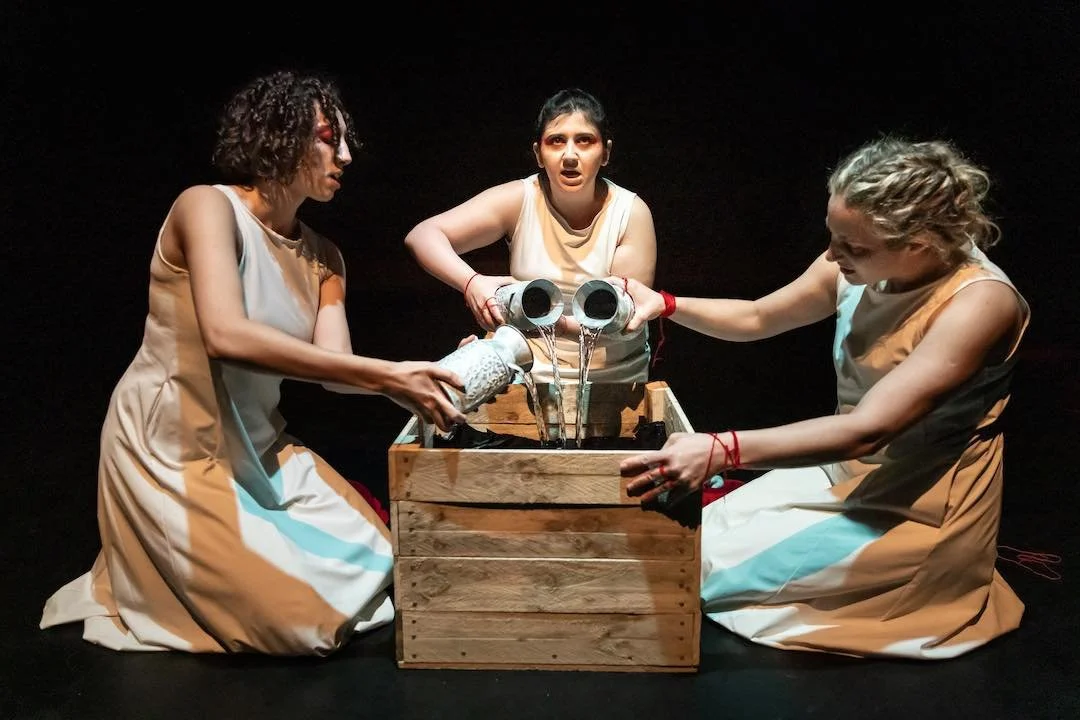REVIEW: Threads of Fate and Freedom in Αριάδνη / Ariadne
Αριάδνη/Ariadne is a bold reimagining of the ancient Greek myth of Ariadne of Crete with original music written and directed by Alkitsi Pitsaki and composed by Nikki Tsetsou. Presented as part of La Mama’s Festival of Mother Tongues from 22 - 24 November.
Writer/ Director/ Vocal Composition: Alkisti Pitsaki
Composer/Vocalist/Pianist: Nikki Tsetsou
Creative Producer: Krystalla Pearce
Lighting Designer: Giovanna Yate Gonzalez
Sound Designer: Todd Bennett
Cast: Christina Arampatzi, Daphne Gerolymou – Papadopoulos, Hyacinth Makka
Review by Helena Pantsis
Christina Arampatzi, Daphne Gerolymou-Papadopoulos, and Hyacinth Makka each embody Ariadne in all her many laments, yearnings, and conflictions, unravelling the red thread in her mind, not unlike the string she used to lead Theseus out of the Labyrinth. Αριάδνη / Ariadne presented La Mama’s Festival of Mother Tongues 2024. Image by Darren Gill.
Alkitsi Pitsaki's reimagining of the tale of Αριάδνη / Ariadne, in their eponymously titled play, re-centres the Cretian sister of the Minotaur in an ancient yet timeless production that parallels the feminine struggle for identity, voice, and to be remembered, that persists today.
Emerging on stage in veils of red, three actors are bound by red threads around their wrists and unfurling from their hands. It is something out of another story at first glance, the trio speaking in riddles about time and destiny, conjuring images of the Μοιραι, the Fates. It is a haunting beginning, us thrust into the tangle of Ariadne's mind as she is torn between saving her brother, the Minotaur, from his suffering, and finding a means to stop the deaths of innocent Athenians, arriving in sevens every seven years to be condemned to his Labyrinth below.
Part of La Mama’s Festival of Mother Tongues, the work is an adaptation of a previously premiered audio play, with eerie harmonies and Alexandra Tsoukala's vocals rising like the waters around Crete in moments where Ariadne, in all her incarnations, can breathe. Christina Arampatzi, Daphne Gerolymou-Papadopoulos, and Hyacinth Makka each embody Ariadne in all her many laments, yearnings, and conflictions, unravelling the red thread in her mind, not unlike the string she used to lead Theseus out of the Labyrinth. The symbol is an obvious one, but the familiarity with this cliche works, as in a story of ancient origins, to repeat what has been done before is simply to acknowledge where the origins of a thing lie.
Yet, despite powerful imagery and sound, it is Giovanna Yate Gonzalez's lighting that steals the show, in its shifting colours and perfectly timed soft and harsh focuses. During an attempted reconstruction of the ceremonial Crane dance by the Ariadnes, the light shifts and grows so the shadows dance hauntingly on the walls beside them. The figures follow along like ghosts, echoing the actresses' brilliant bodywork and adding a further layer of abstractness to the already metaphysical telling of the myth. They are near impossible to look away from, and further mimic the parallels that happen in time, place, light and shadow.
The play has a distinct Greekness about it that transcends the use of language throughout the show, capturing the unique style of Greek storytelling that diverges from Western expectations, often telling without showing, and allowing the importance of the unsaid, the silence, the σιγαλιά to carry the story along just as well as what is spoken.
Though, at times, it is an emotional thing to hear Ariadne as she reverts to her mother tongue—but not in the winding sentences of poetic reflection—instead, the most powerful moments come in the simple lines: in Makka's gentle "θέλω να φύγω" ("I want to leave") or in the impassioned "ελευθερία!" ("freedom!") ringing out from the trio on stage. In these simplicities, the work becomes grounded in the now, and Ariadne is just a girl like myself, begging for the release of her brother, for the man she loves not to betray her, and for history, for once, not to repeat itself.
Unlike the original myth, this story is not destined to be a tragedy; as she compels her alter egos throughout, Ariadne must choose her own fate. She does not mince words, telling us, though I paraphrase, "θέλω να με θυμάσαι ως Αριάδνη" ("I want you to remember me as Ariadne"). She is not someone's sister, someone's princess, someone's daughter, someone's lover, she is only ever herself. And by the end of the production, if one thing is for certain: you will remember her name.
This review is part of MAV’s initiative to foster culturally responsive theatre criticism, amplifying diverse voices and perspectives in the arts. By inviting writers, storytellers and artists to review the works of fellow creatives through the lens of shared lived, or cultural experiences, we aim to highlight the importance of theatre reviews that challenge dominant narratives and provide deeper, culturally grounded perspectives.

